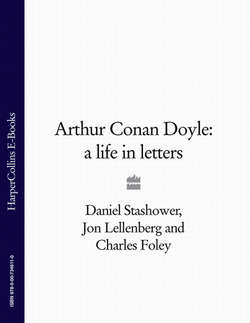Читать книгу Arthur Conan Doyle: A Life in Letters - Daniel Stashower, Исмаил Шихлы - Страница 42
to Mary Doyle STONYHURST
ОглавлениеI have good news for you, namely that Uncle Conan’s letter has gone a week ago. I thought I would never finish it. I sent him a playbill and I slily changed the A. DOYLE on the bill into A. C. DOYLE to gratify him. I hoped Aunt Susan was well several times, and I sent her an indefinite number of kisses. I send you the photograph. I am awfully sorry about that blotch behind, the truth of the matter is that having bought it during recreation I had no place to put it, so I tied it up in my handkerchief, but wishing to blow my nose soon after, I pulled out my handkerchief and the photograph tumbled out, and the back of it got dirtied. I am sure your ingenuity will soon take the dirt away.
The 3rd term has just begun. I have been extremely successful last term, but I was more successful in Arithmetic than in anything else, fancy I got the 2nd highest marks in the school in Arithmetic. The 6th highest in lessons and the 7th highest in History.
My finger is much better and I never felt more jolly. Football, which you reasonably observed to be a rough game, is abolished, and we are to begin ‘Stonyhurst Cricket’ tomorrow. I am Head of a match in cricket and am considered the best player of my size in the Lower Line.
My love to everybody yourself included. since you neglected the Pancakes at Shrovetide I hope you will not forget the hot X buns.
After the close of the school year Conan Doyle found the situation at home increasingly shaky, but his mother determined that he should continue at Stonyhurst. ‘Early in my career there, an offer had been made to my mother that my school fees would be remitted if I were dedicated to the Church,’ he recalled. ‘She refused this, so both the church and I had an escape. When I think, however, of her small income and great struggle to keep up appearances and make both ends meet, it was a fine example of her independence of character, for it meant some £50 a year which might have been avoided by a word of assent.’ Both she and he had also begun to fall away from the Roman Catholicism in which they were raised. In time she left the church to become an Anglican, while Conan Doyle privately renounced Catholicism before leaving school. It was the beginning of a pilgrimage that would end, forty-five years later, in his public commitment to Spiritualism.
Charles Doyle’s decline continued, meanwhile. At one point during the summer his father, who loved the outdoors, went off on an excursion with the head of the Office of Works, Robert Matheson, with Mary Doyle clearly welcoming the effect upon her husband’s increasingly fragile nerves.
